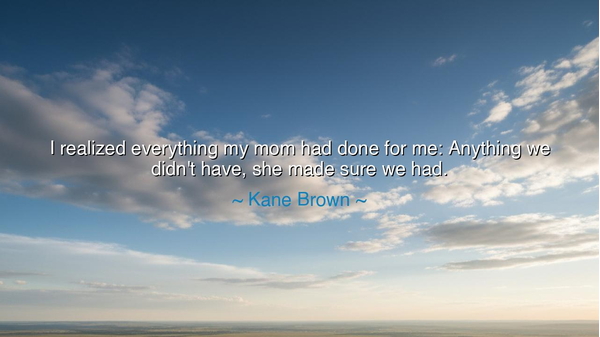
I realized everything my mom had done for me: Anything we didn't
I realized everything my mom had done for me: Anything we didn't have, she made sure we had.






When Kane Brown said, “I realized everything my mom had done for me: Anything we didn’t have, she made sure we had,” he spoke with the voice of revelation — the kind that comes only after hardship, only after the veil of youth is lifted and the truth of love’s sacrifices becomes clear. His words are not simply gratitude; they are the awakening of a man who has looked back upon his life and finally seen the invisible labor of a mother’s love. It is the moment when a child, once blind to the quiet miracles of daily care, suddenly understands that behind every meal, every roof, every comfort, there was struggle, endurance, and devotion.
In the ancient world, poets and philosophers revered this kind of love as the noblest form of strength. The Greeks called it agape — love that gives without demand, that endures without recognition. A mother’s love, they believed, was an echo of the divine: it creates something out of nothing, fills emptiness with abundance, and transforms scarcity into sufficiency. Brown’s words capture that truth perfectly. “Anything we didn’t have, she made sure we had” — that is not only the language of poverty and perseverance, but the language of creation itself. His mother, like countless mothers across time, became both provider and alchemist, turning hardship into nourishment, and love into sustenance.
It is easy for the young to take such love for granted. Children live within the blessings their parents build — unaware of the labor behind them. It is only later, when one faces the burdens of responsibility and the trials of life, that the sacrifice behind love reveals itself. So it was for Brown, who, as a child of humble beginnings, witnessed his mother’s struggles without truly understanding them. But as he rose to success and looked back, the truth came into focus: the shoes she went without so he could have his own, the bills she juggled so he could go to school, the tears she swallowed so he could see only smiles. This realization — this awakening of the heart — is one of the great rites of passage in life. It transforms mere memory into reverence.
History, too, offers examples of such unyielding maternal devotion. Consider Abraham Lincoln, who once said, “All that I am, or ever hope to be, I owe to my angel mother.” His mother, Nancy Hanks Lincoln, raised him in a one-room cabin, teaching him faith, kindness, and self-reliance despite crushing poverty. She could not give him riches, but she gave him something greater — the moral foundation that would one day guide a nation. Like Brown’s mother, she “made sure he had” everything that truly mattered, even when the world offered little. Such stories remind us that true wealth is not measured in possessions, but in the unseen treasures of love and perseverance.
There is also a quiet heroism in these words. The mother in Brown’s quote does not complain, nor does she boast — she simply acts. Her love is not loud or performative, but constant, enduring, and creative. This is the kind of strength that often goes unnoticed, yet it is the strength upon which civilizations stand. The ancient Chinese philosopher Lao Tzu once said, “The softest thing in the world overcomes the hardest.” So it is with a mother’s love — gentle in gesture, but indestructible in spirit.
And Brown’s realization carries a universal message for all who hear it: that gratitude is a form of wisdom. To realize what was done for us — to truly see it — is to awaken to life’s deeper harmony. It reminds us that love often hides in plain sight, in small acts, in tired hands, in quiet sacrifices that no one celebrates. When we recognize those moments, we not only honor those who gave to us; we become capable of giving in the same way.
So, let this truth be passed down as a teaching for all generations: cherish those who have made something out of nothing for your sake. Look back upon your life and see the hidden architects of your fortune — the parents, guardians, teachers, and friends who built bridges across your struggles. And if you are called to love others, do so as Brown’s mother did: not with grand gestures, but with daily acts of care, persistence, and faith.
For in the end, love is the power that multiplies what is scarce, and gratitude is the wisdom that recognizes it. The one who realizes this — as Kane Brown did — sees that no gift is greater than a mother’s heart, and no act of repayment more sacred than living a life that honors her unseen labor.






AAdministratorAdministrator
Welcome, honored guests. Please leave a comment, we will respond soon